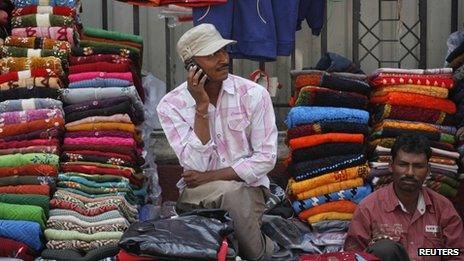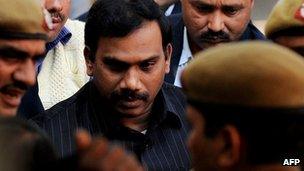Huge implications of Indian court's mobile phone ruling
- Published

The court ruling has created numerous winners and losers
The Indian Supreme Court order to cancel 122 mobile licences issued by former Telecoms Minister A Raja four years ago will severely affect millions of subscribers, domestic and foreign investors, public and private sector banks and key leaders in the government, argues business analyst Alam Srinivas.
Among the licences given by Mr Raja which were dubbed as unlawful by the apex court, six companies - including Uninor (Unitech-Telenor), Videocon, SingTel, Loop, and Etisalat - were newcomers to the Indian market.
They have more than 50 million Indian subscribers - or 5.5% of the total base market of almost 900 million people.
The judgement said that they will need to transfer to other operators within the next four months.
In addition, there will be tens of millions of customers of firms like Idea Cellular - which got licences for nine areas including Calcutta, West Bengal, Punjab and Karnataka, and Tata Teleservices, which got three - who will have to take a similar decision.
Downward trend
Even if these subscribers shift to other mobile operators, the latter will find it difficult to handle the additional traffic given their technical - especially when it comes to the availability of spectrum - and operational constraints.

Some fear that mobile firms may use the court order as an opportunity to raise tariffs
More important, plagued by either low profitability or huge losses, existing mobile firms may use this order as an opportunity to raise tariffs.
A 2011 Price Waterhouse Cooper report concluded that the key trends in the Indian telecom sector included "stagnation in revenue, declining profitability, slowdown in investments, and increase in costs".
The report found that the average revenue per minute for voice calls - and minutes of usage per subscriber - showed a downward trend.
The Economic Times reported on Wednesday that an increase of 20-30% in tariffs over the next 12 months was a distinct possibility. It may now happen sooner.
"The cancellation of licences will reduce competition and lead to higher call rates. The only way to counter this is for the government to issue fresh licences through an auction process within the next four months," says telecoms expert and MP Rajeev Chandrashekhar.
The picture for foreign telecoms investors is mixed. Some may take a beating while others will positively benefit as a result of the judgement.
They either arrived on their own - SingTel came in January 2008 - or later by buying a stake in Indian firms such as Docomo, Telenor and Etisalat.
Their huge investments - Docomo paid $2.8bn for a stake in Tata Teleservices, for example - will need to be written off.
Otherwise the government can allow them to match the price established through the new auction route to retain their existing licences.
In this case, the foreigners will still turn out to be losers. They will pay twice - to buy a stake in Indian firms at a huge premium or match the new auction price.
However, the biggest relief for existing and prospective foreign investors in the telecom sector is the fact that the Supreme Court has established the supremacy of Trai - the Telecom Regulatory Authority of India - on policy issues.
"The order has said nothing about corruption. It has cancelled the licences because the due process of law was not followed in the granting of the licences. Trai's recommendations were either not accepted by the telecoms ministry, or accepted in a piece-meal fashion," explains Mr Chandrashekhar.
From now on, the telecoms ministry will be obliged to listen to Trai's options, or re-refer them to the regulator if it wants changes to be made.
In the hot seat
Domestic investors will have to decide whether they wish to exit the mobile sector at a huge loss, or re-enter it through the forthcoming auction and invest additional sums.

Former minister A Raja is in prison for alleged corruption in giving out telecom licences
Indian banks (both state-owned and private), whose exposure to the telecom firms is over $20bn, may end up being the biggest losers.
The State Bank of India has maintained that its loans are protected through personal guarantees of the firms' owners or promoters' shares pledged to the banks.
But if the licences are cancelled and the firms do not bid for fresh licences, the prices of their shares will plummet and their personal guarantees will hold no value.
Senior cabinet ministers like P Chidambaram, who was the finance minister when Mr Raja issued the 122 licences and is now the home minister, and Telecoms Minister Kapil Sibal now find themselves in the hot seat because of the apex court's order.
There is also a case against Mr Chidambaram in the lower court. He is alleged either to have sided with Mr Raja during the decision-making process in 2007-08, or not tried to stop him.
Mr Sibal has publicly stated his belief that Mr Raja followed policies and processes that were not laid down in the past.
The Supreme Court has also categorically deemed those processes to be illegal.
Alam Srinivas is author of The Indian Consumer
- Published12 December 2011
- Published13 April 2011
- Published2 February 2012